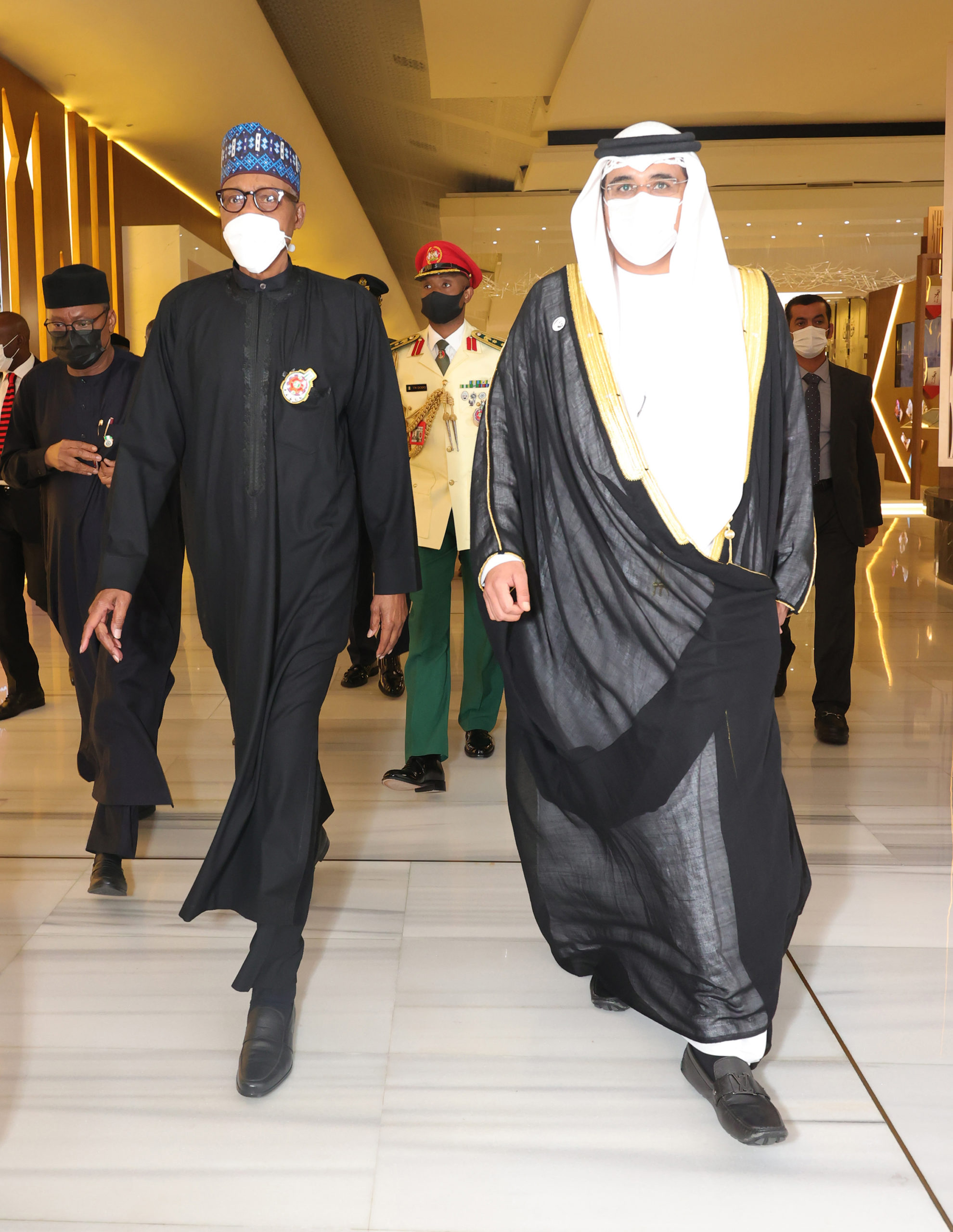President Muhammadu Buhari led a retinue of 10 ministers and other senior government officials to Dubai Expo 2020, recently. The expo is an annual event that usually lasts for some six months. Its promoters describe it as “a global event that links innovation, technology, art, and culture to offer a great experience.” It is essentially a trade fair that brings manufacturers, sellers, and buyers together. Covid-19 forced the organisers to shift the 2020 to 2021.
This was the first time a Nigerian leader would lead a team of ministers to an expo. It smacks of desperation to catch investors wherever they can be found. Even at that, it should not be difficult to appreciate the president’s decision to make our country a looming presence in that great international arena where business deals are hammered out for mutual benefits.
Our economic situation is both dire and desperate. Whatever plans the government had for growing and managing the economy must have been thrown out of kilter by the rampaging pandemic, Covid-19. Wooing investors naturally becomes a desperate act for all countries desirous of emerging from the trauma of the pandemic with a stronger economy. As the Onitsha man likes to say, it is not easy; it is not going to be easy.
As president, Buhari is the principal marketer of hope in our country as well as the chief promoter of its economic potentials and investment opportunities. It behoves him to do whatever he deems necessary in the circumstances to attract direct foreign investments into our country to help improve our economy and make it strong enough to bear the burden of the 13 trillion Naira debts placed on it.
There was, therefore, nothing strange in his decision to attend an international trade fair. Still, it was a brave attempt by a tall president to stand tall before the international community to make a pitch on our economic and investment opportunities, given our current domestic circumstances that do not constitute the best of times for wooing investors. The president addressed participants at the expo on Nigeria’s National Day. He wisely did not make a grandiloquent sales pitch because he knows what the rest of the world knows about us and our current domestic situation.
He said, “Connecting Minds, Creating the Future; the theme of the ongoing Expo has placed a moral burden on all relevant shareholders across national boundaries. Therefore, the Nigerian delegation is participating in this Expo with great prospects for positive outcomes while assuring the world of our determination and readiness to partner with relevant investors in our bid to tackle a number of challenges to make Nigeria a better country.”
Wooing investors is a duty incumbent on the sojourner in Aso Rock Villa. One of our grandmasters in this was President Olusegun Obasanjo. When he assumed office on May 29, 1999, Nigeria was still reeling from its pariah status post the General Sani Abacha administration. He had three immediate tasks, namely, to end the country’s pariah status, promote Nigeria’s new democratic credentials and open its vast economic and investment opportunities to the rest of the world. He undertook a series of foreign trips towards this end.
The number of his trips were duly recorded by the late Chief Gani Fawehinmi to give it back to the president as part of his profligate ways. Something good did come out of his trips and the sales pitch. Our pariah status melted like butter. Rebuilding the confidence of the international community in our political stability was no easy task. Direct foreign investments trickled in at first and later flowed into what was seen as a new Nigerian nation. Sadly, much of that gain has been lost to the strange ways of the Nigerian system.
Buhari chose a different tact. He chose to place on all nations collective, the moral burden of partnering with one another to meet their individual domestic challenges. That pitch is rather strange in that investors do not act on the basis of morality. They do so entirely in accordance with their business interests. A foreign investor does not do another country a favour when he takes his money there. He is the primary beneficiary of his investment; the country is the secondary beneficiary. His only condition is an assurance that the investment environment and conditions are good enough to make his investment safe.
Those conditions include but are not limited to political stability, security of lives and property and a clear fiscal policy fully protected by law from the whims and caprices of those who call the shot in a given country. If these conditions are fulfilled, he would not need much persuasion to go where his money would make him much more money.
Wooing foreign investors is a competitive global business. A country’s faithful attendance at expos would not alone guarantee the free flow of direct foreign investments. The real challenge for our leaders is the hard-headed management of the national economy. The easy resort to foreign loans is not indicative of that hard-headed management. History, it bears repeating, has no records of struggling nations that made the leap with foreign loans. If the managers of our national economy lay a solid foundation for it, foreign investors would be prepared, not on moral grounds but in their business interests, to help the nation build on it; and we can march confidently out of the woods.
We do not need cosmetics in the management of our national economy. Such routines are deleterious to an economy reeling from multiple challenges of dwindling earnings from the country’s principle revenue source, crude oil; the ravages done to the economy by the Covid-19 pandemic; the internal challenges of poverty, corruption, political instability, and insecurity. The managers of our national economy must think outside the box and begin now to seriously think of how to cut a new path through the forest of challenges towards the promised economic development land.
The much-vilified SAP of the President Ibrahim Babangida administration still remains for me the way to go for a country determined to build its economy from its internal resources. SAP was a response to the inability of our tens of so-called manufacturing enterprises that depended on imported basic raw materials to survive. When they could not afford to import their raw materials, the hum in the factories was silenced; workers were thrown to the labour market and the nation was confronted with the truth of its flawed manufacturing sector, the live wire of industrial development. Politics killed SAP; it also killed the principles of building a nation’s economy on its internal resources rather foreign loans.
If we learn and apply the right lessons to the needed radical management of our national economy, we will climb out of the depth of our poverty and have foreign investors eating out of our hands. It would be the path to an Abuja Expo.

 Join Daily Trust WhatsApp Community For Quick Access To News and Happenings Around You.
Join Daily Trust WhatsApp Community For Quick Access To News and Happenings Around You.


